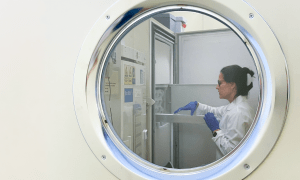Barcelona welcomes the advances that are revolutionising the therapeutic use of the microbiome

IrsiCaixa is organizing the eleventh edition of the international congress on the human microbiome, which addresses topics such as the therapeutic use of bacteria and their relationship with intestinal and brain health
The composition and activity of the gut microbiota –that is, the set of microorganisms that live in our gut– can determine the body's response to infections, complex diseases, medications and even vaccines. The term microbiome, often used synonymously, refers to the set of genes of these microorganisms and their functional impact on health. To analyse how to take advantage of this microbial ecosystem in favour of human health, a new edition of the international congress The Barcelona Debates on the Human Microbiome returns to Barcelona. Organised by IrsiCaixa –a centre jointly promoted by the "la Caixa" Foundation and the Department of Health of the Government of Catalonia– the congress will be held on 26 and 27 June at the CosmoCaixa Science Museum, and will bring together leading experts in the field of the microbiome.
Coinciding with World Microbiome Day, the congress will address the latest advances in scientific research carried out in this field, and will be coordinated by the director of IrsiCaixa Bonaventura Clotet, the doctor emeritus of the Digestive System Research Unit of the Vall d'Hebron Hospital Research Institute Francisco Guarner and the principal investigator of IrsiCaixa and head of the Infectious Diseases Service of the Germans Trias i Pujol Hospital, Roger Paredes. "Current knowledge allows us to start intervening on the microbiome selectively, precisely and safely. This opens up therapeutic scenarios that were unthinkable only ten years ago", says Guarner.
One of the most innovative ways to intervene in the microbiome is through live biotherapeutics (LBPs). "These are biological drugs made up of live bacteria, grown in controlled conditions in the laboratory, which are administered specifically for therapeutic purposes", explains Paredes.
Bacteria to the rescue: an alternative to stool transplants
One of the presentations of this edition will be given by the CEO of the biotechnology company Vedanta Bioscences Bernat Ollé, who will present the most recent results of VE303. This living biotherapeutics contains eight strains of bacteria of the genus Clostridia, common in the human intestine and cultured under controlled conditions.
VE303 is designed to prevent the recolonization of Clostridioides difficile, a bacterium responsible for recurrent and often serious intestinal infections, especially after antibiotic treatments. Currently, one of the most effective options for treating these infections is stool transplantation, which involves transferring healthy gut microbiota to the affected person. This technique has proven to be very useful in restoring the bacterial balance of the gut and effectively eliminating pathogenic bacteria. However, it has some drawbacks: it is difficult to control exactly which microorganisms are transferred, and it carries potential risks of pathogen transmission.
"With VE303 we want to offer a safe, standardised and effective alternative to faecal transplants which, despite being useful, have limitations", explains Ollé. "The compound has so far shown good results in terms of safety and efficacy, and we will soon begin phase III of the clinical trial, the last step before we can approve it as a treatment," he details. If its potential is confirmed, VE303 could become a new therapeutic tool and open the door to a medicine that uses bacteria selected and cultured specifically to protect health.
Not just bacteria: their metabolites also protect the brain
Microbiome research is not only focused on bacteria, but also on the compounds they generate. An example of this is a recent study involving researcher María R. Aburto, from APC Microbiome Ireland and speaker at this year's conference. Research shows that two metabolites produced by gut bacteria –butyrate and propionate– can protect the blood-brain barrier, an essential structure that protects the brain from toxic substances. They do this by acting on the cells that form the barrier: restructuring their "skeleton", strengthening junctions between cells and maintaining key functions, even in situations of inflammation.
"Our research shows that metabolites from the microbiota can act directly on the brain to protect its natural barriers", explains Aburto. "These results reinforce the idea that the therapeutic potential of the microbiota also includes its metabolites as key players. This opens the door to developing new therapies based on metabolites that could strengthen the blood-brain barrier and prevent damage in contexts of neuroinflammation or neurodegenerative diseases", he adds.
The microbiome as an ally in the fight against HIV
This same strategy of modulating the microbiota with specific bacteria or metabolites is being explored at IrsiCaixa to improve the efficacy of a therapeutic vaccine against HIV. The researchers are currently working with three live biotherapeutics –VE800, VE417 and VE804– to analyse, in preclinical models, how they influence microbial composition and whether they can improve the T cell response generated by the vaccine. "We are exploring how the gut ecosystem can condition the efficacy of vaccines and whether we can modulate it to obtain better immune responses", says Paredes. "This research situates the microbiome not only as a biomarker, but as a therapeutic tool in itself", he concludes.